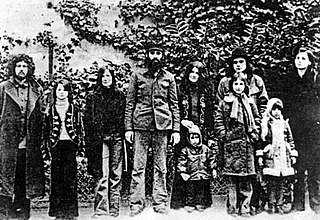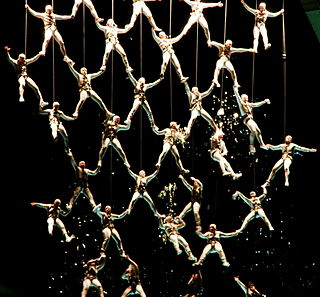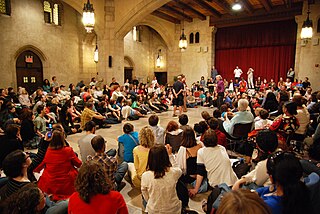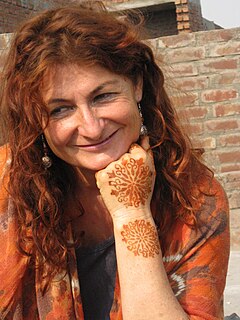
Carinthia is the southernmost Austrian state or Land. Situated within the Eastern Alps, it is noted for its mountains and lakes. The main language is German. Its regional dialects belong to the Southern Bavarian group. Carinthian Slovene dialects, forms of a South Slavic language that predominated in the southeastern part of the region up to the first half of the 20th century, are now spoken by a small minority in the area.

Articles related to Austria include:
Invisible theatre is a form of theatrical performance that is enacted in a place where people would not normally expect to see one, for example in the street or in a shopping centre. Performers disguise the fact that it is a performance from those who observe and who may choose to participate in it, thus leading spectators to view it as a real, unstaged event.

Experimental theatre, inspired largely by Wagner's concept of Gesamtkunstwerk, began in Western theatre in the late 19th century with Alfred Jarry and his Ubu plays as a rejection of both the age in particular and, in general, the dominant ways of writing and producing plays. The term has shifted over time as the mainstream theatre world has adopted many forms that were once considered radical.

Squat Theatre (1977–1991) was a Hungarian theatre company from Budapest which left Hungary for Paris and then New York City, where they performed experimental theatre. Several members left the company in 1985 when they lost the lease to their space on 23rd Street including Anna Koós, Péter Halász, Eric Daille, and Agnes Santha. The rest of the company continued until 1991, Squat Theatre's last play was Full Moon Killer, 1991, performed at The Kitchen in New York City.

Favoriten, the 10th district of Vienna, Austria, is located south of the central districts. It is south of Innere Stadt, Wieden and Margareten. Favoriten is a heavily populated urban area with many residential buildings, but also large recreational areas and parks.

The Vienna Volksoper is an opera house in Vienna, Austria. It produces three hundred performances of twenty-five German language productions of opera, operetta, musicals, and ballet, during an annual season which runs from September through June.

The Walnut Street Theatre, founded in 1809 at 825 Walnut Street, on the corner of S. 9th Street in the Washington Square West neighborhood of Philadelphia, is the oldest operating theatre in the United States. The venue is operated by the Walnut Street Theatre Company, a non-profit organization, and has three stages: the Mainstage, for the company's primary and larger productions, the Independence Studio on 3, a studio located on the building's third floor for smaller productions, and the Studio 5 on the fifth floor, which is rented out for independent productions. In May 2019, the Walnut Street Theatre announced a major expansion, to begin in 2020.

In Austrian politics, a district is a second-level division of the executive arm of the country's government. District offices are the primary point of contact between resident and state for most acts of government that exceed municipal purview: marriage licenses, driver licenses, passports, assembly permits, hunting permits, or dealings with public health officers for example all involve interaction with the district administrative authority.

La Fura dels Baus is a Spanish theatrical group founded in 1979 in Moià, Barcelona (Spain), known for their urban theatre, use of unusual settings and blurring of the boundaries between audience and actor. "La Fura dels Baus" in Catalan means "The ferret from Els Baus". According to a 1985 review of their London performance, published in NME, the group "create a kind of adult adventure playground of fun, danger, slapstick and fantasy".
Community art, also sometimes known as "dialogical art", "community-engaged art", or "community-based art", refers to the practice of art based in and generated in a community setting. Works in this form can be of any media and are characterized by interaction or dialogue with the community. Professional artists may collaborate with communities which may not normally engage in the arts. The term was defined in the late 1960s as the practice grew in the United States, Canada, the Netherlands, the United Kingdom, Ireland, and Australia. In Scandinavia, the term "community art" more often refers to contemporary art projects.

The Theatre of the Oppressed (TO) describes theatrical forms that the Brazilian theatre practitioner Augusto Boal first elaborated in the 1970s, initially in Brazil and later in Europe. Boal was influenced by the work of the educator and theorist Paulo Freire and his book Pedagogy of the Oppressed. Boal's techniques use theatre as means of promoting social and political change in alignment originally with radical-left politics and later with centre-left ideology. In the Theatre of the Oppressed, the audience becomes active, such that as "spect-actors" they explore, show, analyse and transform the reality in which they are living.

The Royal Lyceum Theatre is a 658-seat theatre in the city of Edinburgh, Scotland, named after the Theatre Royal Lyceum and English Opera House, the residence at the time of legendary Shakespearean actor Henry Irving. It was built in 1883 by architect C. J. Phipps at a cost of £17,000 on behalf of James B. Howard and Fred. W. P. Wyndham, two theatrical managers and performers whose partnership became the renowned Howard & Wyndham Ltd created in 1895 by Michael Simons of Glasgow.
Athens – Epidaurus Festival is an annual arts festival that takes place in Athens and Epidaurus, from May to October. It is one of the most famous festivals in Greece. The festival includes musical, theatrical and other cultural events.

Herbert Gantschacher is an Austrian director and producer and writer.
ARBOS – Company for Music and Theatre in Vienna, Salzburg and Klagenfurt, is a society specialized in the realisation of new forms of theatre especially of projects for contemporary new music theatre, scenic concerts, theatre for young people, theatre concerts, deaf theatre, directed space, theatrical exhibitions and other forms of the arts.

The July Putsch was a failed coup attempt against the Austrofascist regime by Austrian Nazis from 25 to 30 July 1934.
The Austro-Slovene conflict in Carinthia was a military engagement that ensued in the aftermath of World War I between forces loyal to the State of Slovenes, Croats and Serbs and later the Kingdom of Serbs, Croats and Slovenes, and forces loyal to the Republic of German-Austria. The main theater of the conflict was the linguistically mixed region in southeastern Carinthia. The conflict was settled by the Treaty of Saint-Germain in 1919, which stipulated that the territorial dispute be resolved by a plebiscite.
Anna Schober is an Austrian historian and University Professor of Visual Culture at the Institute for Cultural Analysis of the Alpen-Adria University Klagenfurt.

Editta Braun is an Austrian choreographer, stage dancer, dance pedagogue as well as founder and director of the Salzburg dance company Editta Braun Company. She is known as a pioneer of contemporary dance in Austria and chairwoman of tanz_house, the association of freelance choreographers based in Salzburg.














